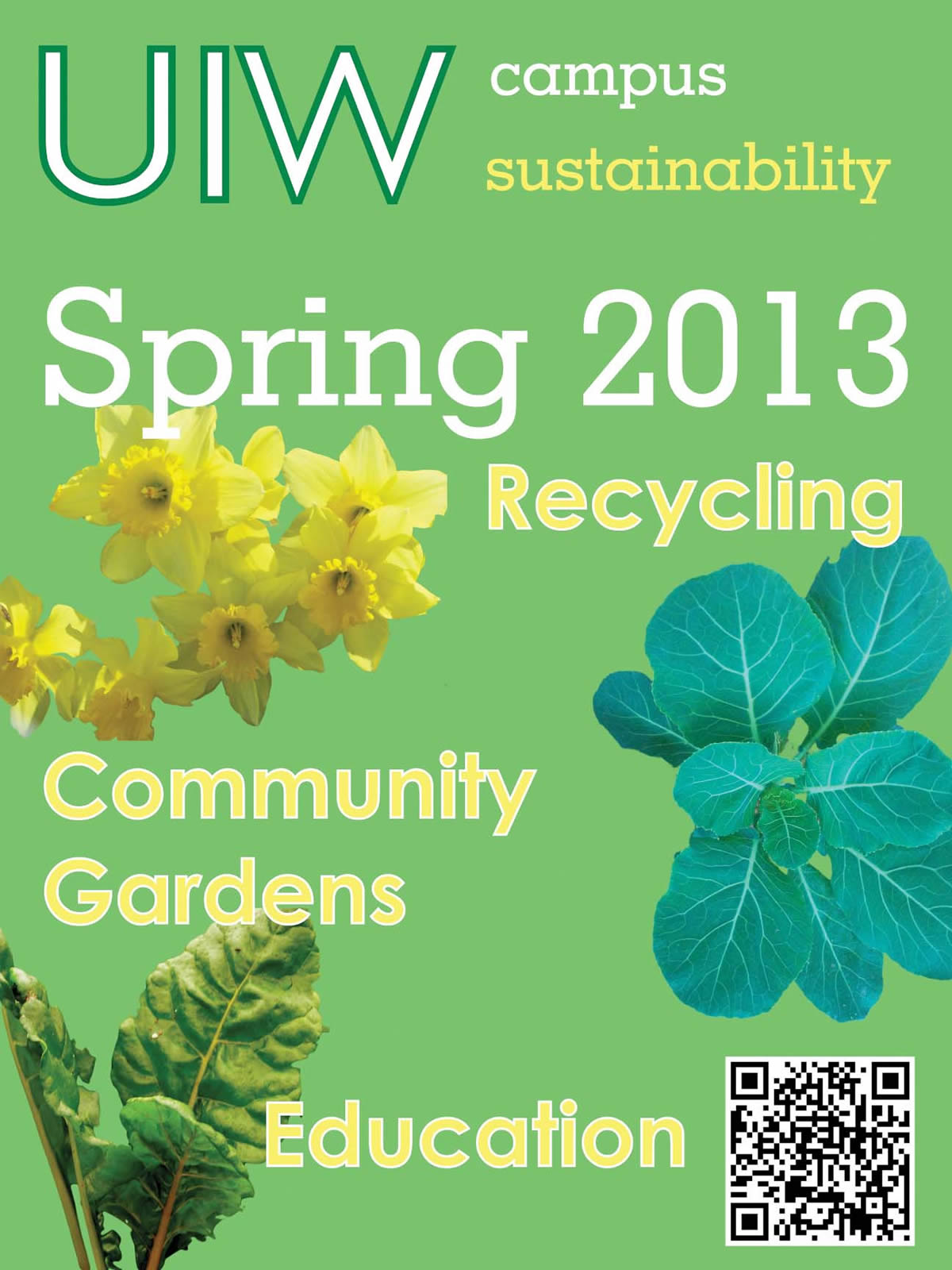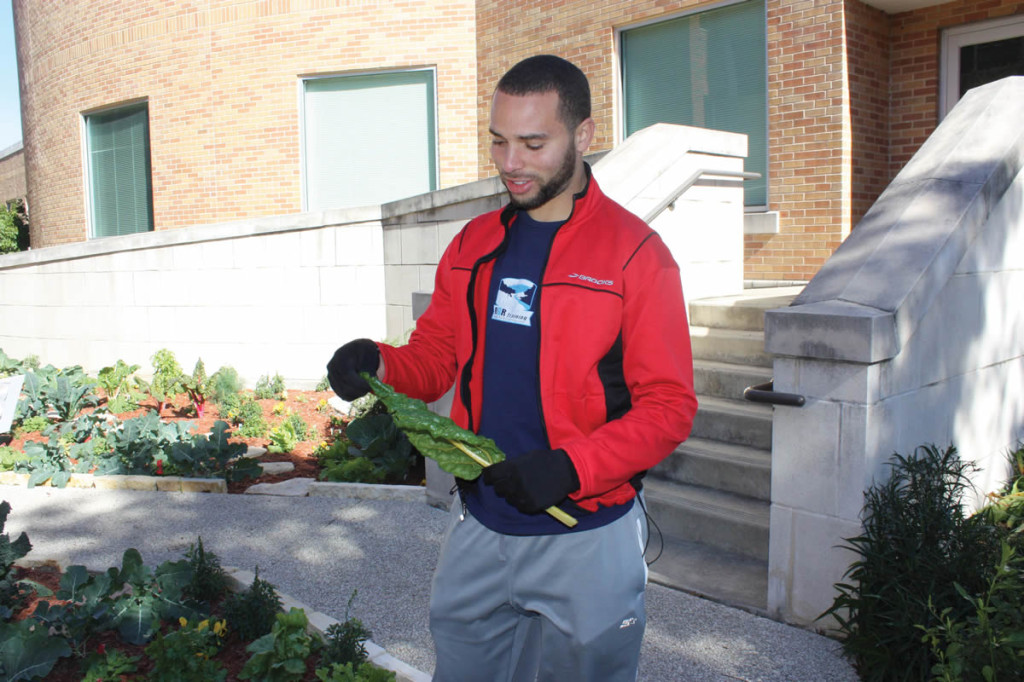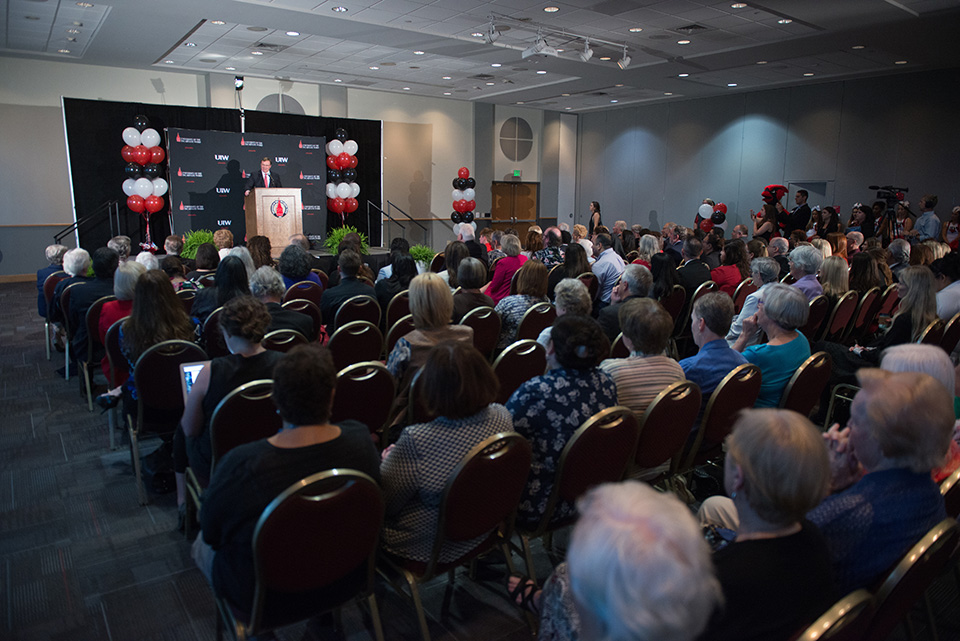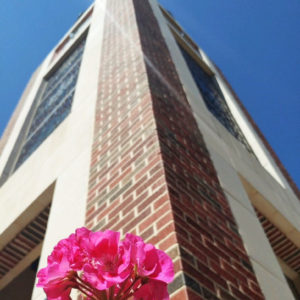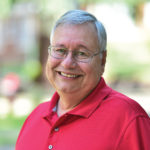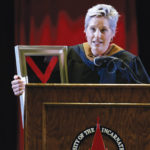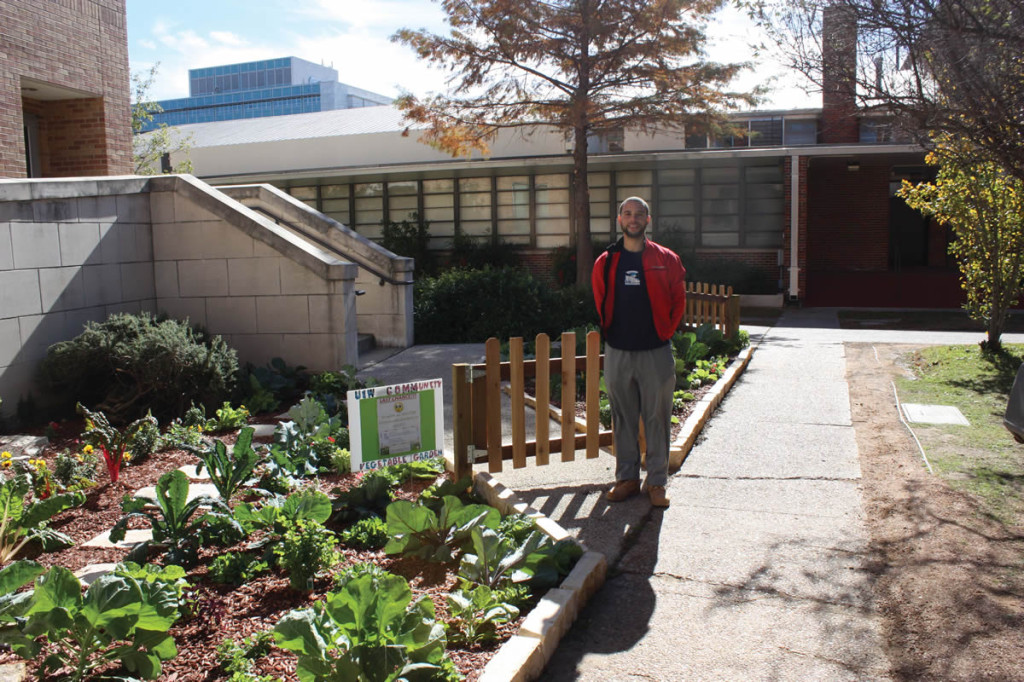
Stephen Lucke poses with the UIW Community Vegetable Garden behind the Gorman Business and Education Center.
By Brance Arnold ’10 MA
In the summer of 2012, as a student employee for UIW’s grounds department, Stephen Lucke had a vision to create a UIW Community Vegetable Garden on campus. He sought to bring the UIW community together for a project that would not only serve an ornamental purpose, but a functional one as well. And now his vision has come to fruition.
The inspiration for the project stemmed from Lucke’s experience with the grounds department.
“If we can do all this work for ornamental gardens,” explained Lucke. “We can find a garden that could produce fruits and work in symbiosis to serve a beautiful purpose for aesthetics but also serve a functional purpose by providing nutrition.”
Located behind the university’s Gorman Business and Education Center, the garden’s initial planting consisted of edible fall and winter crops such as kale, broccoli, Swiss chard, collard greens, leafy greens, and a variety of herbs including cilantro, basil, parsley and rosemary. Ornamental plants were also introduced into the garden such as petunias, pansies (which are edible), and snapdragons. The garden includes a compost bin to recycle decomposing, organic matter for use as fertilizer and soil amendments. After the fall harvest, Lucke plans to plant and harvest spring crops followed by a summer planting.
The process of creating the garden and designating a location on campus began with facilities management and the Superintendant of Grounds William Mulcahy.
“The plot assigned to him was in the educational development area,” explained Mulcahy. “This area was not used and was neglected and needed improvement. It seemed natural for Stephen to clean up and create a sustainability garden in this area.”
According to Mulcahy, the Gorman building plot was chosen for the amount of light that would reach the beds and because it was in a central location that could be easily accessed.
Originally, when the Gorman building was constructed, Mulcahy said he was asked to create an outside classroom, a garden for the blind, and a path for the blind with multiple types of surfaces. “The idea was for future teachers to close their eyes as if they were blind students,” Mulcahy explained. “They were to feel and smell plants as a blind student would. They would walk barefoot over the multiple surface walk area.”
“So, Mr. Mulcahy said clean up that area and you can put your garden there,” said Lucke. “And so I began the process in September.”
In implementing the idea for the UIW Community Vegetable Garden, Lucke garnered the support of members of the UIW community such as Dr. Glenn James, associate provost, Dr. Alison Whittemore, chair of the department of engineering, and Roberto Hoffman, UIW’s master gardener. Lucke also spoke with Dr. Richard Peigler, professor of biology, and Sr. Martha Ann Kirk, CCVI, professor of religious studies, who were both instrumental in creating UIW’s Holy Land Garden located in front of the AT&T Science Center. The Holy Land Garden contains plants cited in the Holy Scriptures of the Jewish, Christian, and Islamic religions.
Lucke even assisted in cleaning up the Holy Land Garden after meeting with Peigler. “Stephen did a wonderful job because the garden got really overgrown. He volunteered to do some work and I was delighted,” explained Peigler. “He’s on a different track with the other garden because it’s about sustainability. I think he’s poured his heart into it.”
Kirk believes Lucke’s garden further accentuates the themes of stewardship and compassion intended with the Holy Land Garden. “The UIW Community Vegetable Garden is continuing the common-good theme of the Holy Land Garden and helps our students carry on this initiative for the common-good of all the community,” expressed Kirk.
The grounds department provided the plants and equipment needed to begin planting. To initiate and maintain the UIW Community Vegetable Garden, Lucke decided to host Saturday Morning Wellness/Garden Volunteer Workdays. Workdays provide an opportunity for the community to work in the garden and practice wellness.
“That’s how we got the garden started,” Lucke shared. “We put out advertising. We had workdays where people came out and cleared out the area and planted. The Dimensions of Wellness class led by Dr. Heather Barton-Weston really helped out.”
Lucke looks to also incorporate wellness education and activities into the workdays. “We need to keep it growing and why not tie in wellness with education and awareness,” said Lucke. “Whether we’re in the gardens, Headwaters Sanctuary, going for a jog, or doing yoga, it will be about education in a fun sense.”
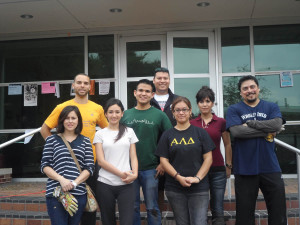
Lucke (pictured top left) shares a photo with UIW student volunteers on Dec. 1, 2012 during a Saturday Morning Wellness/Garden Volunteer Workday. Students can earn community service hours by participating in the workdays.
Mulcahy agrees the garden will benefit the UIW community primarily by providing education and awareness about sustainability, and feels Lucke has done an effective job with the garden. “The garden looks wonderful,” he said. “The plants are very healthy and growing well. Stephen’s idea of mixing ornamental plants in with the edible plants was a good one.”
The workdays provide a chance for UIW students to earn community service hours. And though he plans to share the garden’s produce with the UIW community, Lucke is looking to work with outside entities like the San Antonio Food Bank and create opportunities for off-campus community service hours.
“You need 45 hours to graduate so it makes sense that students are getting the community service,” said Lucke. “We are working with outside organizations to give a portion of our proceeds to these sources and not just affect Incarnate Word, but the San Antonio community. We know there are so many people underprivileged and not as blessed as we are, so we are giving back and it makes it a broader impact.”
Justin Arrendondo-Guerrero, a UIW student who has assisted Lucke with the garden, said the workdays have become more than community service and social outings. “We have begun integrating education and interest regarding green culture, fresh foods, and environmental wellness,” said Arrendondo-Guerrero. “Our goal is to promote campus sustainability and pride that will leave a lasting impression even after graduation.”
Lucke seeks to make his efforts a collaborative venture with UIW’s other organizations such as the Sustainability Committee, Beautification Committee, and the student organization SUSTAIN as well the Headwaters Coalition, a ministry of the Sisters of Charity of the Incarnate Word. He wants to involve the schools of the Brainpower Connection; St. Peter Prince of Apostles Elementary School, St. Anthony’s Elementary School, Incarnate Word High School, and St. Anthony Catholic High School, giving younger students an opportunity to be outdoors, be active and learn about nature and sustainability.
The ideal goal for Lucke is to have the garden continue after he leaves UIW and for it to remain a source of education and an essential part of UIW’s sustainability efforts for years to come. Another goal is to have the UIW Community Garden be included in student orientation to help perpetuate themes of sustainability as students ascend in classification.
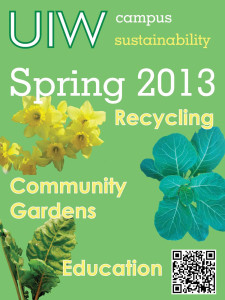 Lucke, who graduated in December 2012 with a bachelor’s degree in both bio-chemistry and chemistry, is now pursuing his master’s degree in multi-disciplinary studies with a concentration in nutrition. He attributes his ability and knowledge in successfully planting the garden to his studies at UIW and his experience as a work study and student employee for the grounds department.
Lucke, who graduated in December 2012 with a bachelor’s degree in both bio-chemistry and chemistry, is now pursuing his master’s degree in multi-disciplinary studies with a concentration in nutrition. He attributes his ability and knowledge in successfully planting the garden to his studies at UIW and his experience as a work study and student employee for the grounds department.
“I think coming to Incarnate Word and seeing the nature on campus, working with grounds, my education, and my natural inquisitiveness have all melded together,” said Lucke. “I consider Incarnate Word a sanctuary; it’s my sanctuary and this is an opportunity to have a place to perhaps center oneself. And a garden isn’t a bad place to do it.”
Lucke plans to become a master gardener and also establish a non-profit, Tri-Fit, to work with youth to reduce childhood obesity through education and awareness. Tri-Fit, created for UIW’s Business Plan Competition last year and a competition finalist, is designed to provide afterschool programs in less affluent areas of the city. Tri-Fit fuses the idea of health and wellness in mind, body and spirit.
UIW’s Community Vegetable Garden is one more profound addition to the efforts of the university in becoming more sustainable. And Lucke feels the university is actively taking measures to be stewards of the environment.
“We are on the right track,” he said. “We have the system in place. It’s just making it more efficient. I’m hoping I can help do that.”
To learn more about The Holy Land Garden, visit www.uiw.edu/garden/index.htm. Visit the UIW Community Vegetable Garden on Facebook for more information and schedule of workdays at www.facebook.com/UIWCommunityGarden.
See additional photos on page 2.

